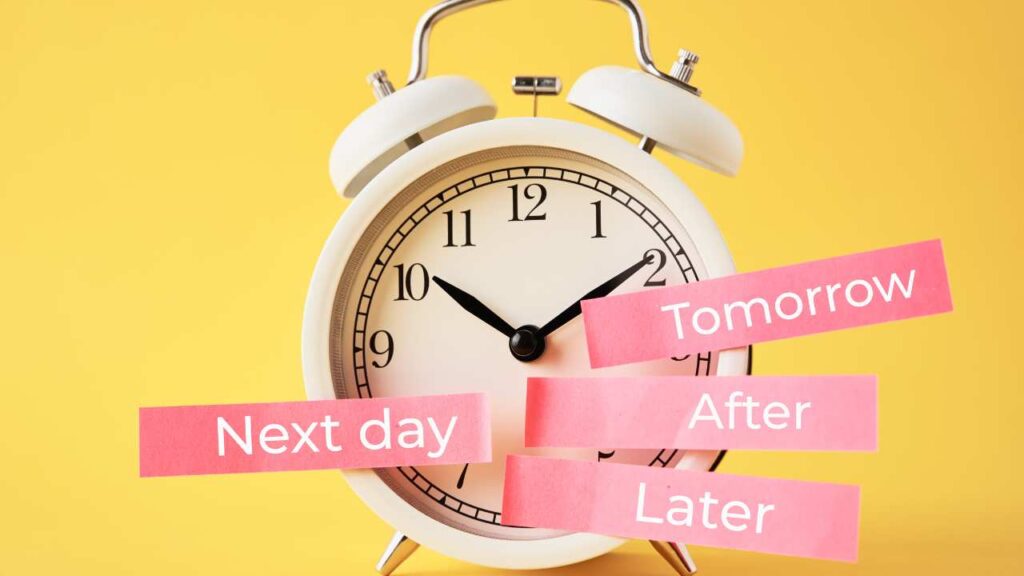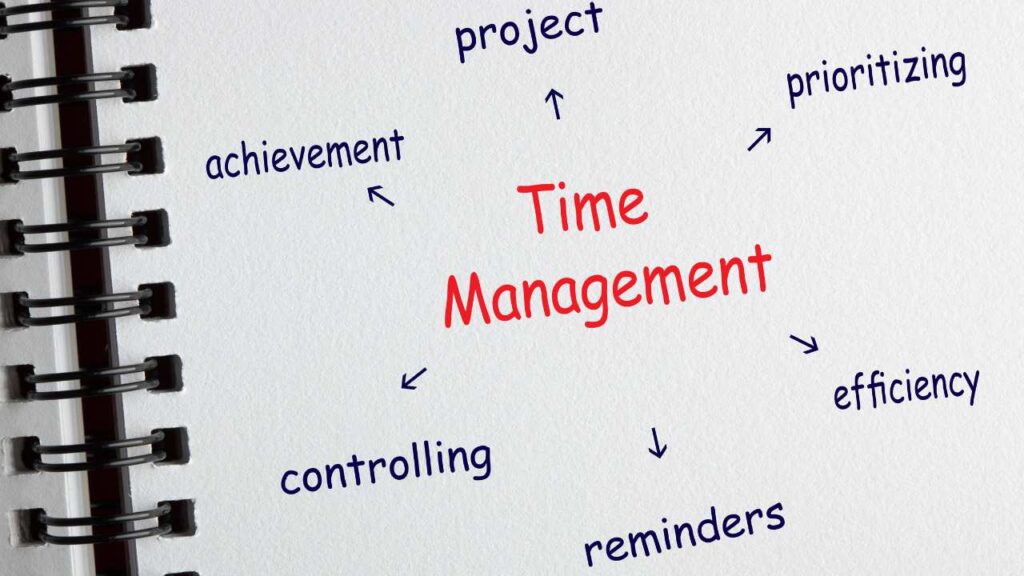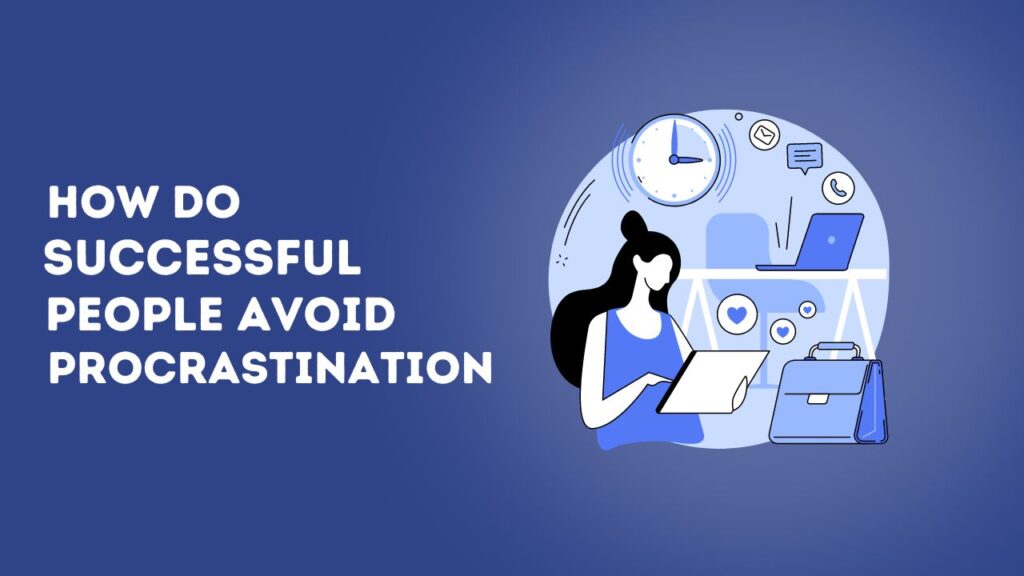How Do Successful People Avoid Procrastination?
Successful people beat procrastination by setting clear goals and breaking tasks into small, manageable steps. They prioritize tasks and stick to a schedule that incorporates regular breaks to maintain focus.
Procrastination often stands as a significant barrier to achieving success and productivity.
Successful people understand this and adopt a proactive approach to manage their time effectively.
They engage in meticulous planning and set specific, measurable objectives which they strive to accomplish within set deadlines.
Prioritization is key, as it enables them to tackle high-impact tasks first, ensuring that their energy is directed towards activities that offer the greatest returns.
By segmenting larger projects into smaller, more digestible pieces, they avoid feeling overwhelmed, maintaining motivation and momentum.
Furthermore, they create well-structured schedules that balance work with adequate rest, recognizing that consistent performance is sustained by a healthy work-life balance.
These strategies not only help them in circumventing the pitfalls of procrastination but also elevate their efficiency and productivity, paving the way for their success.
The Procrastination Dilemma

Successful people shine in many areas, and their ability to tackle procrastination stands out.
The Procrastination Dilemma captures the constant battle between immediate pleasure and long-term goals.
Addressing this challenge is key in the journey toward productivity and achievement.
Defining Procrastination
Procrastination is a tricky opponent. It’s choosing later over now, delaying important tasks.
Understanding its true nature gives clues to overcoming it.
Successful individuals recognize procrastination as a barrier to excellence.
Common Misconceptions
Myths about procrastination often mislead. It’s not about being lazy.
It springs from emotions, not work ethic.
Here’s the reality of common fallacies:
- Myth: Procrastinators lack time management.
- Truth: It’s more about mood management.
- Myth: Waiting inspires better work.
- Truth: It often leads to stress and poor quality.
- Myth: It’s a minor problem.
- Truth: Chronic procrastination hinders success.

Traits Of Successful Individuals
Successful people share traits that set them apart from others.
They tackle tasks with precision and focus. These individuals know that time is valuable.
As such, they develop productive habits and a strict mindset.
This approach keeps procrastination at bay.
Key Habits For Productivity
Productive people follow key habits. These are not secrets but simple daily actions.
These actions transform their goals into results.
- Planning: They plan each day the night before.
- Prioritizing: Important tasks come first.
- Time blocks: They set specific time slots for work.
- Breaks: Short breaks boost their focus.
- Delegation: They share tasks when possible.
Mindset And Discipline
Mindset shapes our actions. Successful people think differently.
Discipline is their tool. It helps them say no to distractions.
They focus on goals, not obstacles.
| Mindset Traits | Discipline Actions |
|---|---|
| Positivity | Consistent routines |
| Resilience | Strict deadlines |
| Growth focus | Rejecting procrastination |
| Vision | Regular self-evaluation |
Strategies To Combat Procrastination
Even the most successful people can face procrastination. But they conquer it with proven strategies.
They prioritize tasks and manage their time well. Let’s dive into these winning habits.
Prioritization Techniques
- Eisenhower Matrix: Distinguish urgent and important tasks. It helps to focus.
- ABC method: Rank tasks by importance. ‘A’ is most critical, ‘C’ least.
- Pareto Principle: Identify the 20% work that yields 80% results.
Here’s an easy Eisenhower Matrix:
| Urgent and Important (Do first) | Important, Not Urgent (Schedule) |
|---|---|
| Deadline-driven projects | Long-term planning |
| Urgent, Not Important (Delegate) | Neither Urgent Nor Important (Eliminate) |
| Some emails | Time-wasting activities |
Time Management Essentials
- Set clear goals: Define what needs achieving each day.
- Pomodoro Technique: Work for 25 minutes. Then take a short break.
- Time blocking: Assign specific hours to tasks. Avoid multitasking.
Use digital tools to track time. They keep you accountable and focused.

Creating An Effective Work Environment
Creating an effective work environment is key to overcoming procrastination.
Successful people take deliberate steps to shape their surroundings in a way that promotes productivity and minimizes the urge to delay tasks.
By crafting an optimal work setting, they ensure consistent focus and high performance.
Minimizing Distractions
Distractions are productivity killers. To beat procrastination, successful individuals eliminate potential disruptions.
This may involve silencing notifications, using noise-cancelling headphones, or decluttering the workspace.
- Turn off notifications on phones and computers to reduce interruptions.
- Neatly organize your desk to clear the mind and prioritize tasks.
- Set boundaries with co-workers to maintain focus during work hours.
The Role Of Comfort And Ergonomics
Comfort at work is not just about feeling good; it’s about sustaining productivity.
An ergonomic workspace reduces physical discomfort, which can lead to procrastination.
| Element | Benefit |
|---|---|
| Adjustable chair | Reduces back pain |
| Monitor at eye level | Minimizes neck strain |
| Supportive keyboard and mouse | Prevents wrist discomfort |
Incorporating regular breaks also improves comfort, allowing for restoration and renewed focus.
Consider short walks or stretching exercises to stay energized.
Technology And Procrastination
In the digital age, technology often acts as a double-edged sword.
While it can boost productivity, it can also lead to procrastination.
Understanding how successful individuals navigate this landscape is crucial in emulating their success.
Productivity Apps And Tools
Countless successful people harness the power of productivity tools.
These apps are designed to organize tasks, set reminders, and track progress.

With the right setup, technology transforms from a distraction to a assistant in achieving goals.
- Task Managers: Apps like To do list or Asana layout tasks systematically.
- Time Trackers: Tools such as Toggl help monitor time spent on activities.
- Note-Taking: Evernote or OneNote can capture and organize ideas seamlessly.
- Focus Aids: Applications like Forest encourage concentration by discouraging phone use.
Controlling Digital Interruptions
Mastery over digital interruptions is a common trait among achievers.
They control their notifications rather than letting them control attention spans.
- Turn off non-essential notifications.
- Set specific times to check emails and messages.
- Use ‘Do Not Disturb’ during focus sessions.
- Limit social media with apps that restrict usage.
Savvy use of technology sets the stage for a procrastination-free workflow.
Successful people tailor their devices to suit their productivity systems, not the other way around.
Long-term Practices For Sustained Success
Frequently Asked Questions Of How Do Successful People Avoid Procrastination
Success demands consistency and focus.
Long-term practices are keys to sustained success.
Procrastinators often stumble here.
Successful people counter this by ingraining powerful habits.
Continuous Learning And Improvement
Constant growth keeps motivation high.
Successful individuals commit to daily learning.
This could be reading, online courses, or professional workshops.
They set learning goals and track progress, ensuring skill enhancement over time.
- Read at least 30 minutes a day.
- Complete one educational course quarterly.
- Attend industry conferences yearly.
Building A Support Network
Support is critical for long-term success.
Successful people surround themselves with mentors, peers, and friends who provide encouragement and advice.
This network creates a layer of accountability that combats procrastination.
| Support Element | Purpose |
|---|---|
| Mentors | Guidance and experience |
| Peers | Mutual support and shared goals |
| Friends | Emotional support |
Are Successful People Procrastinators?
Successful people can indeed be procrastinators, but many overcome it by prioritizing tasks and adhering to disciplined time management to achieve their goals.
What Is The Most Effective Way To Stop Procrastinating?
The most effective way to stop procrastinating is by breaking tasks into small, manageable steps.
Set clear goals, establish deadlines, and eliminate distractions.
Reward yourself after completing each step to maintain motivation and stay on track.
Why Do High Achievers Procrastinate?
High achievers often procrastinate due to perfectionism, fear of failure, or overwhelming pressure.
They may delay tasks seeking the ideal moment or conditions, leading to procrastination.
This habit can stem from a desire to maintain high standards and avoid mistakes.
Do Millionaires Procrastinate?
Millionaires, like anyone else, can procrastinate.
Their success often involves overcoming procrastination through effective time management and goal-setting strategies.
Conclusion
Successful individuals tackle procrastination by embracing discipline and strategic planning.
They prioritize tasks, set clear goals, and take regular breaks to maintain focus.
Remember, overcoming delays in execution isn’t about perfection; it’s about persistent, incremental progress.
Adopt these habits, and watch your productivity climb to new heights.


